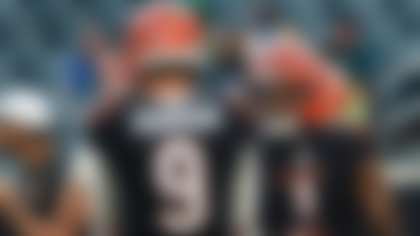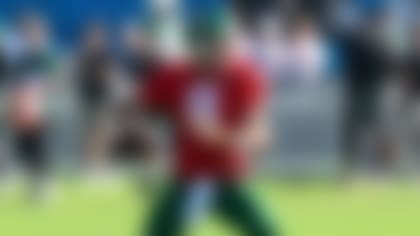In this four-part series, I'm using my context-based data models to evaluate some of the top draft prospects at four key positions -- edge rusher, quarterback, cornerback and wide receiver -- while providing a pro comparison and ideal team fit for each.
- The goal for the comps: showing some of the strengths, weaknesses and unknown résumé aspects for each prospect, while offering a perspective to approximate how team analytics departments might view the player's potential NFL impact.
- The goal for the team fits: maximizing the draftee's 2023 win share, factoring in what we know about each team's personnel, coaches and strategy right now. And of course, as much as possible, I'm aiming to present realistic matches, ones that could actually come to fruition on draft day.
Let's close out the series by examining some enticing WR prospects ...

PRO COMPARISON: Robert Woods
Smith-Njigba appeared in just three games last season due to a lingering hamstring injury, so my assessment is largely based on his 2021 production. Pro Football Focus data shows that in that season -- one where he shared the field with eventual first-round picks Garrett Wilson and Chris Olave -- he averaged 4.01 yards per route run, the fifth-highest single-season mark in the FBS since 2017. He also had more catches on more targets for more yards in 2021 (95/112/1,606) than last season's NFL Offensive Rookie of the Year (Wilson posted a 70/102/1,058 line in his final year with the Buckeyes) and a 2022 PFWA All-Rookie Teamer (Olave went 65/101/936 in '21). PFF calculates explosive receptions as those of 15-plus yards, and in this metric, JSN hauled in 43 in 2021, compared to Wilson's 27 and Olave's 19.
Smith-Njigba did most of his damage at Ohio State from the slot, aligning there more than 87 percent of the time since 2021. But don't label the 21-year-old as a "slot-only" prospect. His low center of gravity with the ball in his hands compares favorably to Woods, who logged a pair of 1,100-yard seasons with the Rams while lining up all over the field. In the NFL, JSN could play more like the L.A. version of Woods, with the ability to generate YAC while being used very effectively on short-to-intermediate targets. The most consistent route-runner and separator in this class, Smith-Njigba can be prolific in the slot, but he doesn't necessarily have to live there.
TEAM FIT: Green Bay Packers
Do I think the Packers will draft a receiver in Round 1 for the first time since 2002 (Javon Walker)? Nope. Especially not now, after moving up to No. 13 via the Aaron Rodgers trade. Do I think they should? YES. Green Bay could take advantage of my top-rated receiver's attributes from Day 1. Computer vision can provide pretty good relative calculations on hip width and notes on thigh, knee, calf and ankle measurements; this helps to contextualize what happened when contact was made in college. And JSN's lower-body measurements fall into a very strong category when it comes to absorbing contact. Giving new Packers QB1 Jordan Love a very reliable route-runner and contact absorber helps project for a higher percentage of intermediate completions.

PRO COMPARISON: Amon-Ra St. Brown
According to computer vision, Addison has the third-fastest burst (speed achieved in the first 3 yards traveled) of any receiver in this draft class when untouched off the line of scrimmage. As the 2021 Biletnikoff Award winner at Pitt, he tied for the most touchdowns in the FBS (17) and logged the fourth-most explosive receptions (40, per PFF). His volume and overall production decreased after transferring to USC for last season, but PFF still charted him with the highest figure in yards per route run (2.78) in the Pac-12. Addison's versatility, smooth route-running, yards-after-catch skills and ability to work in space are reminiscent of another former Trojan, Amon-Ra St. Brown. Marvin Jones Jr. is an additional solid comp.
TEAM FIT: New England Patriots
New England's offense ranked 32nd in red zone touchdown percentage, 27th on third down and 20th in passing yards per game last season. Tossing Addison into a pass-catching group that already added JuJu Smith-Schuster and Mike Gesicki in free agency would not only help third-year QB Mac Jones in the aerial attack, but also open up more space for the running game to flourish. And despite his smaller stature (5-foot-11, 173 pounds), Addison has data markers that show his value across the full route tree.

PRO COMPARISON: Tyler Lockett
I feel like it's important to note that the 5-9, 182-pounder lined up outside on 66.6 percent of his snaps at BC last season, per PFF. Furthermore, computer vision shows that Flowers' ability to separate after the ball leaves his QBs hand ranks in the top 15 percent of my 10-year sample for all WR prospects when aligned wide. His capacity to adapt to inconsistent passes also stands out -- according to computer vision, he boasts a top-notch change-of-direction metric (doesn't lose speed), which is also a proxy for body control. His 503 yards after the catch topped the ACC by more than 120 yards, per PFF, while his 9.7 contested target percentage was the lowest in the ACC, which aligns with what CV shows about his elusiveness. In all four of his seasons for the Eagles, he hauled in five or more receptions on throws of 20-plus yards, including 12 such grabs in 2022. Flowers compares to Lockett because he boasts the innate ability to separate and be a consistent deep threat.
TEAM FIT: New York Giants
New York would benefit from Flowers' ability to stretch the field and create space. I love how Brian Daboll used Stefon Diggs and Gabe Davis together in Buffalo. While the skill sets of his key Giants players fall into different categories, there's no debating his scheme's ability to create explosive plays downfield. Adding Flowers would create even more space for Daboll's attack to exploit.

PRO COMPARISON: A.J. Green
When I vetted this with some of my NFL team folks (execs and scouts), they wanted to make sure I'd stress that this comp falls on the more generous end of the spectrum. Nobody wants to insult Johnston, but rather create fair expectations for a 21-year-old who's yet to take an NFL snap. (After all, Green made the Pro Bowl in his first seven seasons!) According to PFF, Johnston's 3.05 yards per route run led the pass-happy Big 12 last season and ranked fifth in the FBS. Meanwhile, his 8.9 yards after catch per reception ranked second in the nation. Computer vision shows that Johnston's ability to earn more than 1 additional yard after contact (per reception) ranked in the top 20 percent of my ten-season prospect sample. This is where the Green notes align, as these two receivers' post-contact productivity is similar. Johnston is a true outside physical presence. Per PFF, his 19 forced missed tackles on receptions tied for first in the Big 12 and his 23 explosive receptions were tied for third.
TEAM FIT: Houston Texans
My models love pairing Johnston on the outside with Robert Woods in the slot. Whoever's taking snaps for the Texans in 2023 would significantly benefit from Johnston's physicality and ability to create space in the secondary.

PRO COMPARISON: Will Fuller
If you don't touch him off the line of scrimmage -- and Josh Heupel's Tennessee attack routinely schemed this into existence, consistently keeping Hyatt away from press-man coverage -- it's really hard to stop him. His computer-vision burst ranks in the top 15 percent of my 10-year sample of prospect WRs, but it's his speed in the open field that's truly video game-esque. CV shows that when he's targeted on passes of 10-plus air yards and a defender is at least 3 yards away from him, it's curtains. That speed is in the top FIVE percent of my 10-year sample. This also helps explain his average of 18.9 yards per reception and 15 touchdowns, two figures that helped him win the 2022 Biletnikoff Award. He was used on vertical routes a whole lot in Knoxville, and for good reason. Also, I don't remember the last time I saw someone put up 207 yards and five TDs on Alabama -- on just six receptions! Hyatt boasted a 156.5 passer rating when targeted last season, the second-highest figure since PFF began tracking college players in 2014, trailing only Jaylen Waddle's 158.3 mark at Alabama in 2019. Hyatt's 3.27 yards per route run ranked second among qualified FBS receivers last year. He also owns the highest Next Gen Stats prospect score (87) among wideouts in this class.
Fuller's straight-line speed matches most closely to that of Hyatt. It's kind of like Hyatt is Fuller crossed with a taller DeSean Jackson (but minus the return usage). Fuller and Hyatt lack great change-of-direction speed, though, meaning hitches are less fruitful than downfield passes.
TEAM FIT: Minnesota Vikings
According to my models, Hyatt could have a Tee Higgins-like fantasy impact in Minnesota. That's not the play-style comp; it's the fantasy-scoring comp. (Sorry, I had to -- LOVE fantasy.) This isn't to say that Justin Jefferson would lose value -- he'd actually gain value, because Hyatt's open-field speed would require constant attention. In an Aaron Rodgers-less NFC North that looks pretty darn competitive heading into the 2023 season, the reigning division champs could gain a great advantage by adding legit track speed to the receiving corps.
Follow Cynthia Frelund on Twitter.












